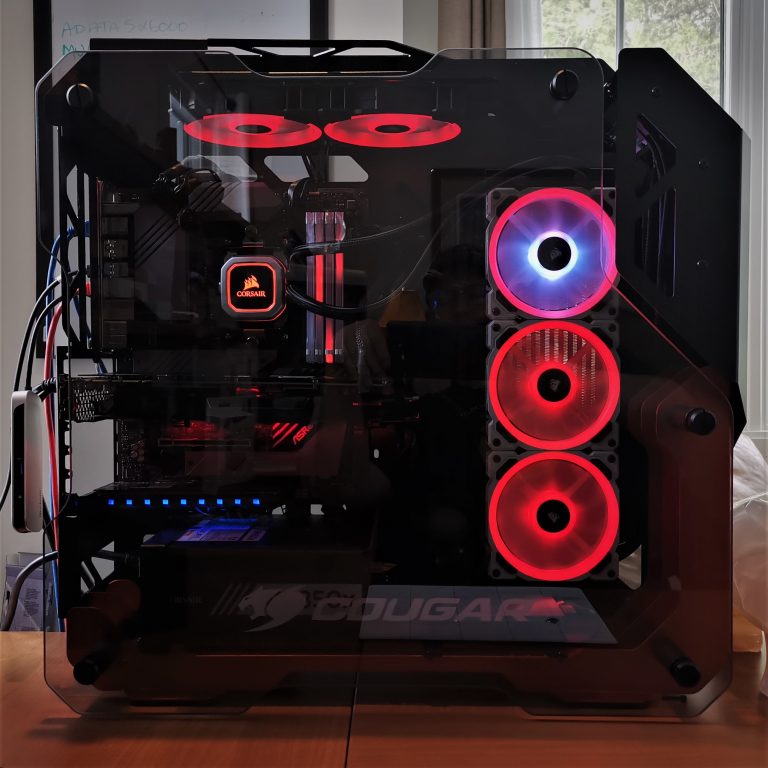TSSDR TEST BENCH AND PROTOCOL
SSD testing at TSSDR differs slightly, depending on whether we are looking at consumer or enterprise storage media. For our Sabrent Rocket 4 Plus Gen 4 NVMe M.2 SSD testing today, our goal is to test in a system that has been optimized and will reach top speeds possible.
We are using our ASRock X570 Creator Test Bench which is AMD based and contains the AMD Ryzen 3700x Gen 4 CPU. Our PC has been overclocked from 3600Mhz to 4300MHz and memory has been set at a XMP profile of 2667MHz,
The components of this Test Bench are detailed below. All hardware is linked for purchase and product sales may be reached by a simple click on the individual item. As well, the title is linked back to the individual build article where performance testing can be validated. Tons of credit to this Cougar Blazer Gaming Case paired with Corsair fans and Corsair iCue RGB software which make this our most attractive case to date.
TSSDR ASROCK CREATOR GEN 4 X570 TEST BENCH (link)
| PC CHASSIS: | Cougar Blazer Open Frame Gaming Mid-Tower Case |
| MOTHERBOARD: | ASRock X570 Creator PCIe 4.0 |
| CPU: | AMD Ryzen 3700x |
| CPU COOLER: | Corsair Hydro H150i Pro RGB 360mm Liquid Cooling |
| POWER SUPPLY: | Corsair RM850x 80Plus |
| GRAPHICS: | MSI Armor Mk 2 Radeon RX570 OC |
| MEMORY: | Corsair Vengeance LPX DDR4 3600MHz |
| STORAGE: | Intel Optane 905P 1.5TB SSD |
| KEYBOARD: | Corsair K57 Wireless Gaming |
| MOUSE: | Corsair Dark Core RGB SE Wireless BT Gaming |
| OS | Microsoft Windows 10 Pro 64 Bit |
BENCHMARK SOFTWARE
The software in use for today’s analysis is typical of many of our reviews and consists of Crystal Disk Info, ATTO Disk Benchmark, Crystal Disk Mark, AS SSD, Anvil’s Storage Utilities, AJA, TxBench, PCMark 8, and we will be conducting true testing data transfer comparisons. Our selection of software allows each to build on the last and to provide validation to results already obtained.
CRYSTAL DISK INFO VER. 8.3.1
Crystal Disk Info is a great tool for displaying the characteristics and health of storage devices. It displays everything from temperatures, the number of hours the device has been powered, and even to the extent of informing you of the firmware of the device.
Click on any graphic for full resolution!
Crystal Disk Info validates that our SSDs are running in PCIe 4.0 x4 (four lane), and also that NVMe 1.4 protocol is in use with features to include SMART, TRIM and VWC.
ATTO Disk Benchmark is perhaps one of the oldest benchmarks going and is definitely the main staple for manufacturer performance specifications. ATTO uses RAW or compressible data and, for our benchmarks, we use a set length of 256mb and test both the read and write performance of various transfer sizes ranging from 512b to 65mb. Manufacturers prefer this method of testing as it deals with raw (compressible) data rather than random (includes incompressible data) which, although more realistic, results in lower performance results.
2TB CAPACITY
1TB CAPACITY
Both the 1 and 2TB versions of the Sabrent Rocket 4 Plus NVMe SSD have very strong performance progression as data sizes increase and we are stating to see the performance differential between the two. Speeds top at 6.97GB/s read and 6.37GB/s write for the 2TB, whereas the 1TB displays 6.9GB/s read and 5.25GB/s write.
 The SSD Review The Worlds Dedicated SSD Education and Review Resource |
The SSD Review The Worlds Dedicated SSD Education and Review Resource | 


Ha, thanks auto fill.
It would be nice to see sustained tests for SSDs to see how fast it is once the cache runs out and then how fast it is once it has to actually write to TLC. I have an older pci3 Sabrent than goes from 1,000MBs to 80MBs after 50GB. Makes copying video footage unusably slow.
@Gavin, and that’s why if you are using a desk top work station Intel’s Optane drives are the best way to go, they don’t suffer from those issues.
I agree with Gavin Greenwalt that the twoost important SSD test is temperature and sustain transfer speed when the cache is full and depends on raw speed.
Please consider this for future review.
Why this one is fastest than the WD SN850 ? That test copying files was embarrassing the SN850 destroyed all of them
yeah i also don’t get it, i prefer the WD SN850 for that copying result, and everything else also just as fast